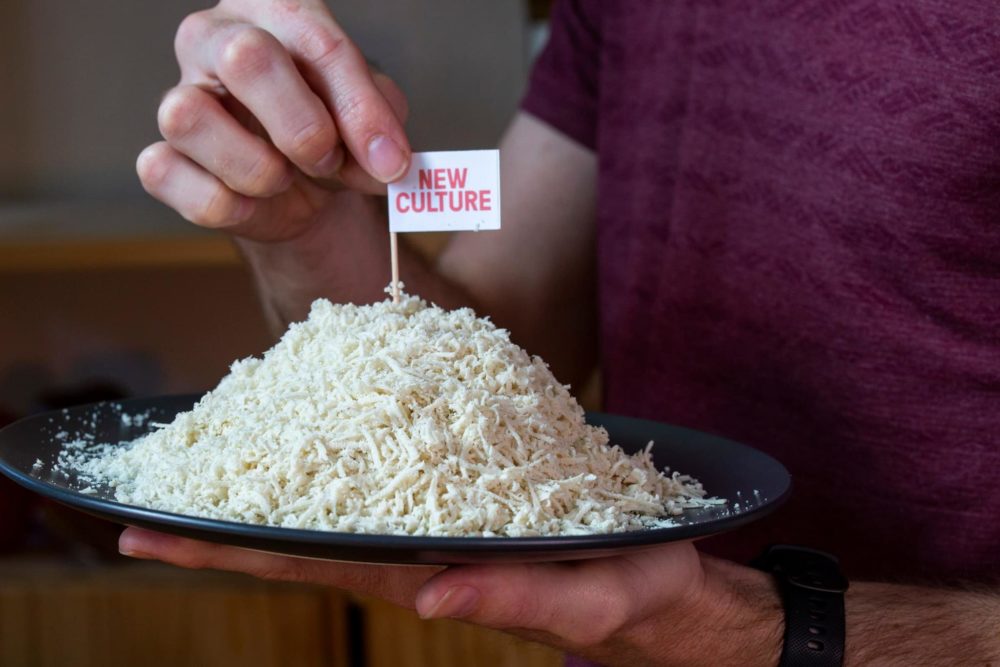US alt-dairy startup New Culture has raised $25 million in Series A funding to bring its bovine-free mozzarella product to market.
Founded in 2018 by CEO Matt Gibson and chief scientific officer Inja Radman, New Culture is using precision fermentation technology to produce casein – the key protein in bovine-derived dairy products that helps give mozzarella and similar cheeses their characteristic stretch, melt, and mouthfeel.
While the San Francisco-based company isn’t giving too much away with respect to its raw materials and methodology, Radman tells AFN that production involves a “two step process: first we make animal-free casein, and second we add plant-based ingredients to the casein to produce cheese.”
“We put sugar into large fermentation tanks and our microbes then turn that sugar into our casein protein. Once we have our animal-free casein, we follow the traditional cheesemaking process by adding our casein to water, fats, salt, and other minerals in order to form melty, stretchy cheese,” she explains.
Gibson tells AFN that the resultant protein is “bio-identical” to that found in traditional cheese, minus the animal inputs – and any of the ecological and ethical baggage that can come with them.
“The dairy cheese industry is extremely unsustainable and yet vegan alternatives fail in comparison – they’re not enticing dairy consumers to buy sustainable animal-free cheese options,” he says.
“We saw several companies trying to tackle similar challenges in the animal-free meat industry and broader dairy but none focused exclusively on dairy cheese. We dove into mozzarella because there wasn’t a vegan version that could melt, stretch, or taste like the real thing. We’ll be expanding to other cheeses next.”
Gibson acknowledges that the ‘animal-free dairy’ landscape is growing increasingly competitive, with numerous fermentation-focused startups scoring significant funding in in recent months.
Just last week, Israel’s Imagindairy closed a $13 million seed round for its milk protein fermentation platform. In September, Berlin-based Formo raised $50 million in Series A funding, while Berkeley’s Perfect Day scored $350 million on its way to a planned IPO next year. Another Californian outfit, Nobell Foods, raised $75 million from investors including AgFunder, Andreessen Horowitz, and Breakthrough Energy Ventures back in July [disclosure: AgFunder is AFN’s parent company.]
What sets New Culture apart, according to Gibson, is that it’s “the sole company laser-focused on casein.”
“Our understanding is that Perfect Day and others are using whey to produce ice cream and cream cheese,” he says. While whey is central to the production of spreadable cream cheeses, casein is the only dairy protein that can make cheeses which “melt, stretch, brown, and have the cheesy qualities we love.”
Meanwhile, Nobell Foods is pursuing casein production through soy plants – “an approach that requires regulatory and scaling challenges that are distinct from our focus,” he adds.
“We’ve cracked the casein code, and a patent is pending on [our] casein production process.”
In terms of traction, Gibson reports that New Culture has increased its output of casein by 200x since starting out three years ago. Test audiences have given its mozzarella product “overwhelmingly positive feedback” on taste, texture, and cooking performance, deeming it “indistinguishable to cow’s milk mozzarella,” he says.
This will “dramatically reduce chef and consumer hesitation [around] animal-free dairy products and instead make them excited to try the future of cheese.”
New Culture’s mozzarella is slated to launch in select pizzerias next year.
The startup’s Series A round was co-led by VCs Ahren Innovation Capital and CPT Capital, with new investors Future Ventures, Marinya Capital, and S2G Ventures also taking part.
Additionally joining as new investors were ADM‘s VC unit, ADM Ventures, and Be8 Ventures – the VC unit of German frozen pizza company Dr Oetker.
Kraft Heinz affiliate Evolv Ventures, Bee Partners, Bluestein Ventures, Mayfield, and SOSV were among the existing New Culture investors to participate in the round.
“In seeking Series A investors, we were intentional about collaborating with experienced food industry professionals,” Gibson says.





